01:07
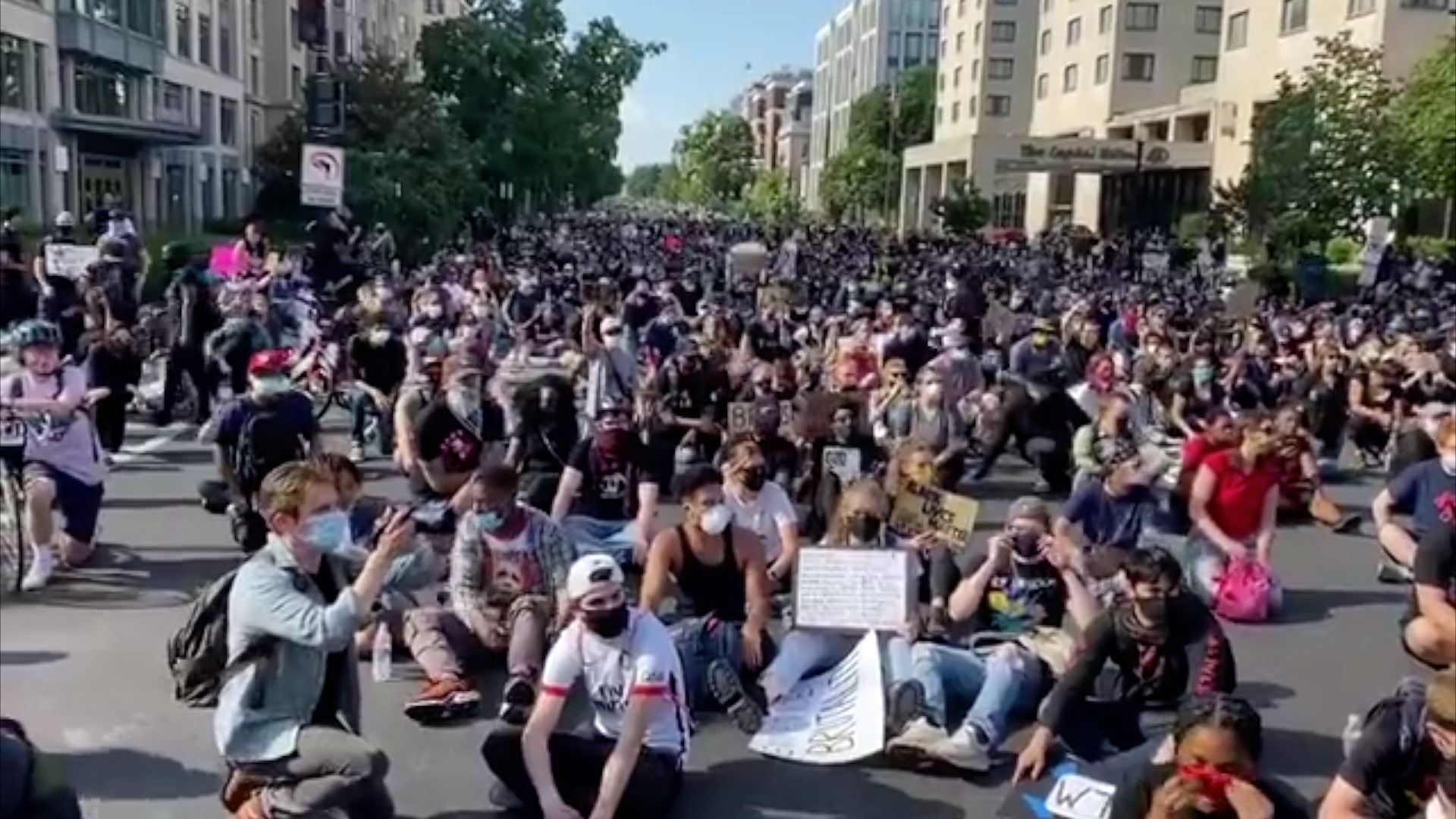
Hours after U.S. President Donald Trump pressed governors to put down the violence set off by George Floyd's death and demanded that New York call up the National Guard to stop the "lowlifes and losers," protesters streamed back into the streets in New York City, Los Angeles, Houston, St. Paul, Minnesota, Columbia, South Carolina, Orlando, Florida as well as in Washington, D.C., where thousands of people gathered to decry the killings of black people.
Trump on Tuesday reiterated his calls to governors to clamp down on "lowlife" protests across the country as leaders across the world continue to condemn the killing of an unarmed black by police last week.
"NYC, CALL UP THE NATIONAL GUARD. The lowlifes and losers are ripping you apart. Act fast! Don't make the same horrible and deadly mistake you made with the Nursing Homes," Trump Tweeted as protests rocked the U.S. for an eighth straight day.
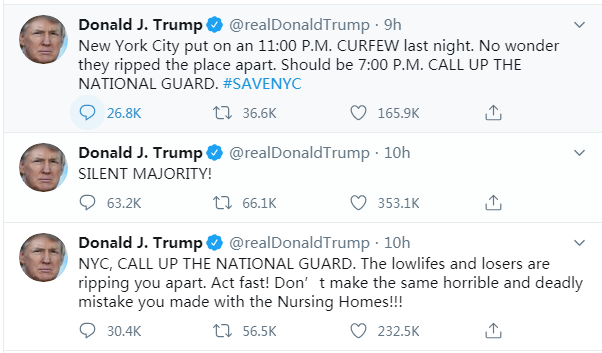
Donald Trump on Tuesday reiterated his calls to governors to clamp down on "lowlife" protests across the country as leaders across the world continue to condemn the black killings. /CGTN screenshot
Donald Trump on Tuesday reiterated his calls to governors to clamp down on "lowlife" protests across the country as leaders across the world continue to condemn the black killings. /CGTN screenshot
Protesters return to streets
Ignited by Trump's tweeting "lowlifes and scums," protesters in Los Angeles and New York City continued to march through city streets after their respective curfews went into effect. Protesters ignored the Government-imposed curfew to return to the streets, while the National Guard was called up in so far 29 states to assist in quelling disturbances.
In New York, midtown Manhattan was pocked with battered storefronts after Monday's protests. Thousands held an orderly march up 86th Street, chanting and holding banners saying "no justice, no peace" and "say his name, George Floyd," followed by a silent vigil. Police made nearly 700 arrests and Mayor Bill de Blasio then extended an 8 p.m. curfew all week. "We're going to have a tough few days," he warned, pleading with community leaders to step forward and "create peace."
Protesters on Tuesday across the country were also back to rally peacefully in Los Angeles, Washington, and Philadelphia.
Around the nation, more than 20,000 National Guard troops have been called up to deal with the violence. New York is not among them, and the mayor has said he "does not want the Guard." On Tuesday, New York Democratic Governor Andrew Cuomo called what happened in the city "a disgrace." Trump yet suggested that violence seen on the streets of this City on Monday night was the result of the governor's failure to accept the offer to deploy the National Guard.
Governors turned down National Guard
As President Donald Trump increasingly turns to militaristic rhetoric at a time of national upheaval, the U.S. military appears to be playing a supporting role. With military power deployed, U.S. Defense Secretary Mark Esper described the protest sites in the nation as a "battlesapce."
On the "battle filed," governors and mayors, Republicans and Democrats alike, rejected Trump's threat to send in the military, with some saying troops would be unnecessary and others questioning whether the government has such authority and warning that such a step would be dangerous.
"Denver is not Little Rock in 1957, and Donald Trump is not President Eisenhower. This is a time for healing, for bringing people together, and the best way to protect civil rights is to move away from escalating violence," Colorado Governor Jared Polis and Denver Mayor Michael Hancock, both Democrats, said in a statement, referring to Eisenhower's use of troops to enforce school desegregation in the South.
Georgia's governor warned Tuesday that he would "do whatever is necessary" to prevent more violence following protests over the death of George Floyd in Minnesota, but he ruled out calling up more National Guard troops or law enforcement officials for now.
02:00
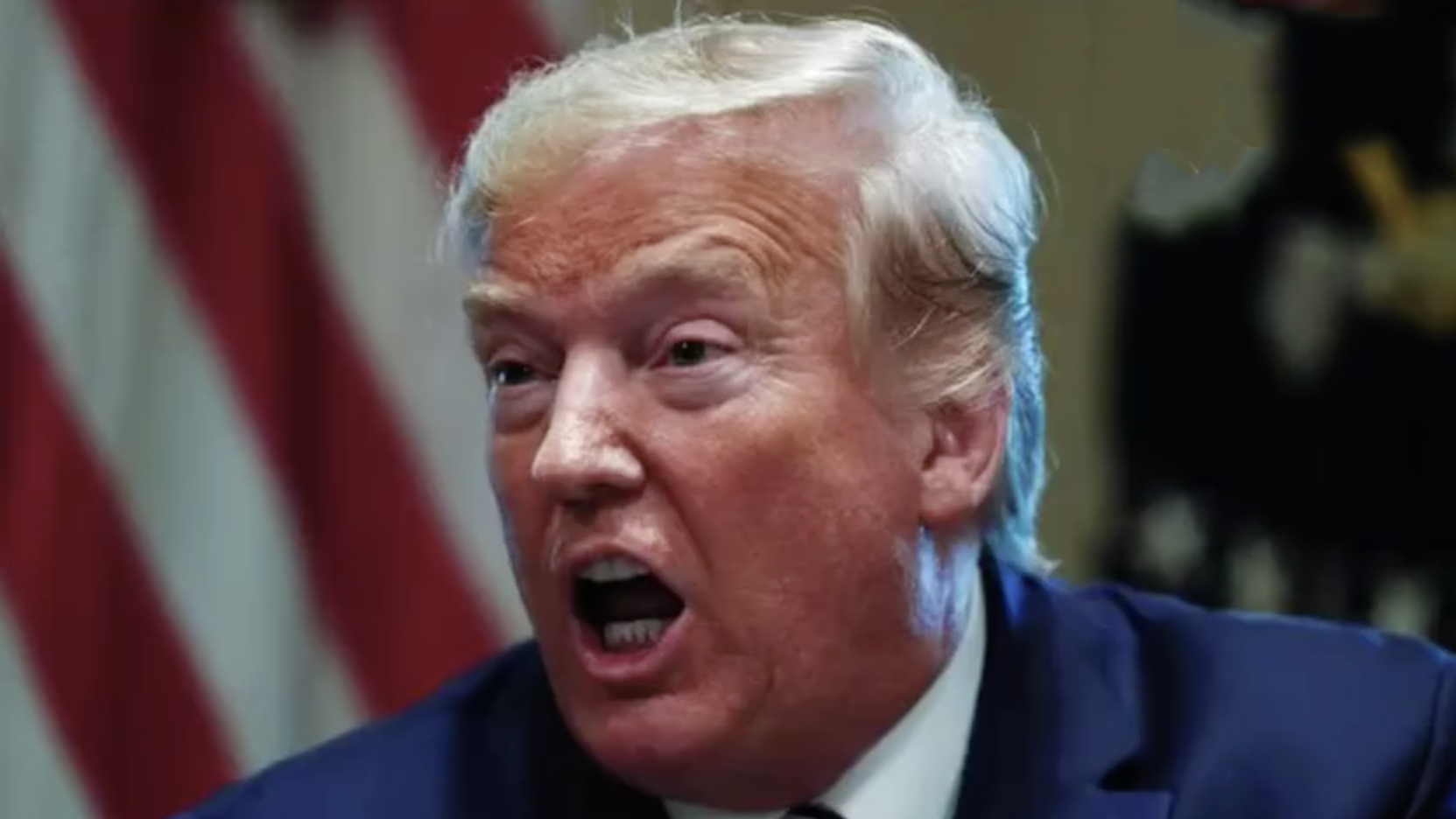
The head of the U.S. National Guard said on Tuesday that 18,000 Guard members were assisting local law enforcement in 29 states.
The Minnesota National Guard has been armed following detection by the FBI of a "credible lethal threat" specifically against it, according to Army Major General Jon Jensen, the head of that state's Guard. In addition to Minnesota, states that have activated troops include Colorado, Georgia, Kentucky, Ohio, Pennsylvania, North Carolina, South Carolina, Texas, and Washington, the Guard said in a statement.
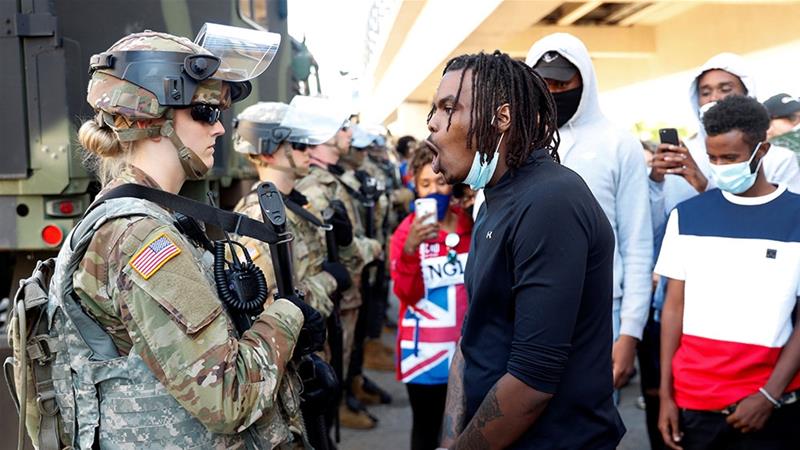
A man confronts a U.S. National Guard soldier in Minneapolis as protesters rally over the death of George Floyd in police custody. /Reuters
A man confronts a U.S. National Guard soldier in Minneapolis as protesters rally over the death of George Floyd in police custody. /Reuters
A senior White House official, speaking on condition of anonymity, said that the president is not rushing to send in the military and that his goal was to pressure governors to deploy more National Guard members.
Is America now a battleground?Is what the troops did turning citizens of the U.S. to its enemy? Such use of the military would mark a federal intervention rarely seen in modern American history. A presidential move to federalize National Guard troops is rare, occurring about 12 times since the mid-1900s, mostly during the Civil Rights era of the 1960s, according to the National Guard press office. It was not invoked in protests following the deaths of other black men in recent years in Ferguson, Missouri, and Baltimore.
From Garner to Floyd, racist killings choke off American society
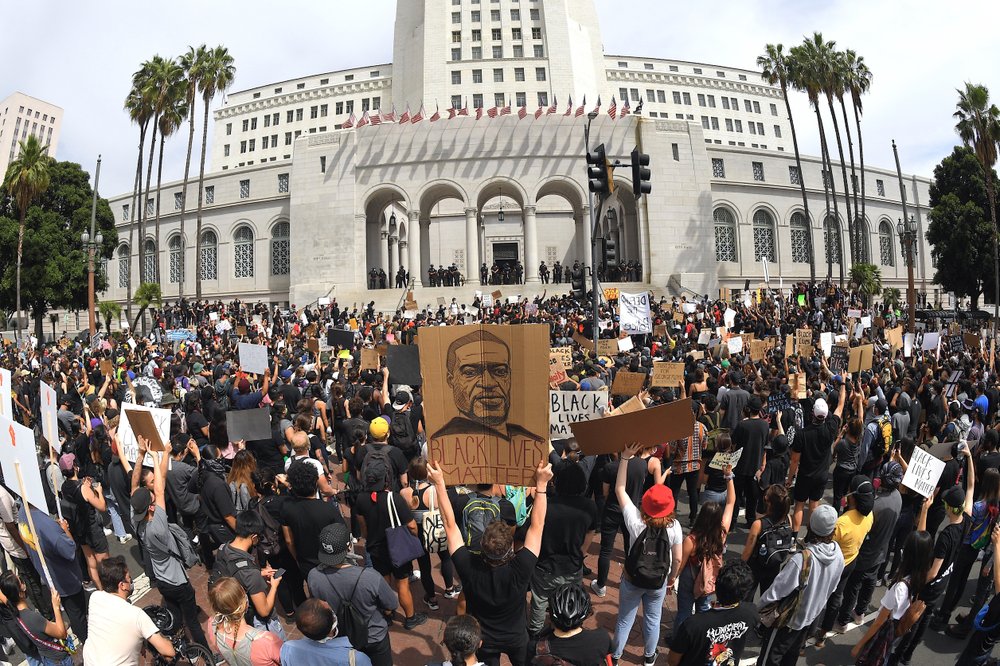
Demonstrators stand in front of Los Angeles City Hall during a protest over the death of George Floyd, June 2, 2020. /AP
Demonstrators stand in front of Los Angeles City Hall during a protest over the death of George Floyd, June 2, 2020. /AP
Tensions go global
Paris streets also saw riots as protesters set fires Tuesday amid growing global outrage over George Floyd's death along with racial injustice and heavy-handed police tactics around the world.
French protesters took a knee and raised their fists while firefighters struggled to extinguish multiple blazes as a largely peaceful, multiracial demonstration degenerated into scattered tensions. Police said at least 20,000 people joined the demonstration, defying a virus-related ban on protests to pay homage to Floyd and Adama Traore, a French black man who died in police custody.
In Amsterdam, London, Vancouver, Rio de Janeiro, and Sydney, protesters chanted "I can't breathe," marched peacefully, and expressed anger in multiple languages in street demonstrations and on social media.
Diplomatic ire percolated too, with the European Union's top foreign policy official saying the bloc was "shocked and appalled" by Floyd's death.
German Foreign Minister Heiko Maas said peaceful protests in the U.S. following Floyd's death are "understandable and more than legitimate."
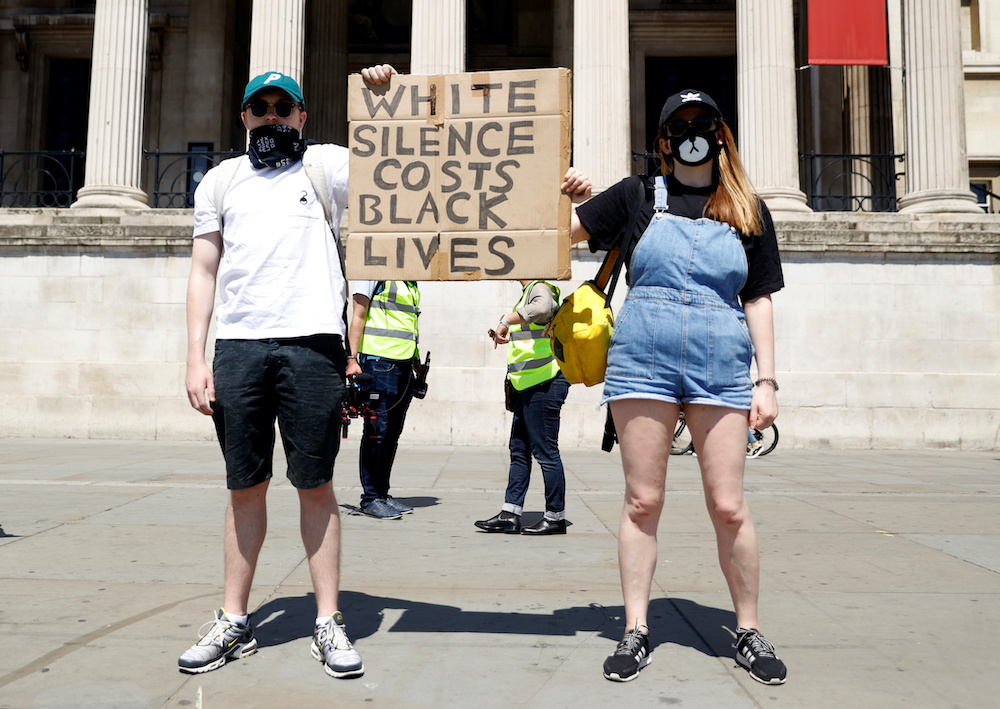
People hold up a sign during a protest against the death of African-American man George Floyd in Trafalgar Square, London, Britain, May 31, 2020. /Reuters
People hold up a sign during a protest against the death of African-American man George Floyd in Trafalgar Square, London, Britain, May 31, 2020. /Reuters
More African leaders are speaking up over the killing of Floyd.
"It cannot be right that, in the 21st century, the United States, this great bastion of democracy, continues to grapple with the problem of systemic racism," Ghana President Nana Akufo-Addo said in a statement, adding that black people all over the world are shocked and distraught.
Kenyan opposition leader and former Prime Minister Raila Odinga offered a prayer for the U.S., "that there be justice and freedom for all human beings who call America their country."
(With inputs from agencies)